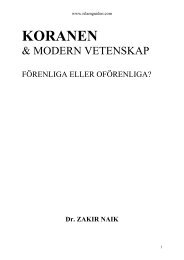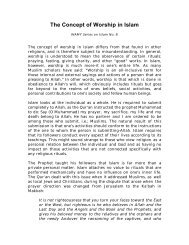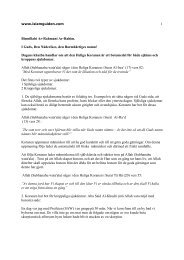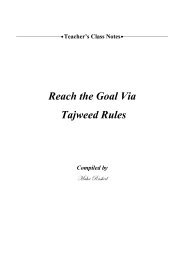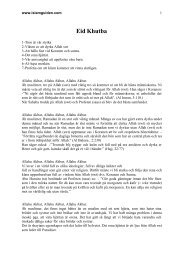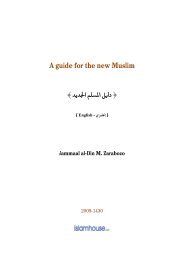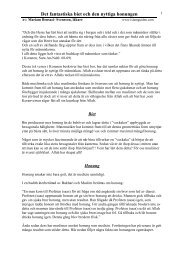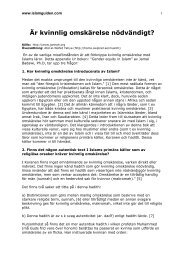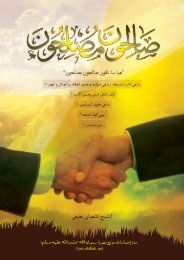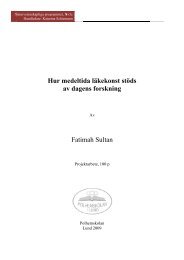The Prophet's Prayer From The beginning To The End As Though ...
The Prophet's Prayer From The beginning To The End As Though ...
The Prophet's Prayer From The beginning To The End As Though ...
Create successful ePaper yourself
Turn your PDF publications into a flip-book with our unique Google optimized e-Paper software.
[34]Ibn al-Qayyim (2/361) & Fulaani (p. 68)<br />
[35]Harawi in Dhamm al-Kalaam (3/47/1), Khateeb in Al-Ihtijaaj bi ash-Shaafi'i (8/2), Ibn '<strong>As</strong>aakir (15/9/10), Nawawi in Al-<br />
Majmoo' (1/63), Ibn al-Qayyim (2/361) & Fulaani (p. 100); the second narration is from Hilyah al-Awliyaa' of Abu Nu'aim.<br />
[36]Nawawi in Al-Majmoo' (1/63), Sha'raani (1/57), giving its sources as Haakim and Baihaqi, & Fulaani (p. 107). Sha'raani said,<br />
"Ibn Hazm said, 'That is, ... found to be saheeh by him or by any other Imaam'." His saying given next confirms this understanding.<br />
Nawawi says: "Our companions acted according to this in the matter of tathweeb (calling to prayer in addition to the adhaan), the<br />
conditions on coming out of ihraam due to illness, and other issues well-known in the books of the Madhhab. Among those of our<br />
companions who are reported to have passed judgment on the basis of the hadeeth (i.e. rather than the saying of Shaafi'i) are Abu<br />
Ya'qoob al-Buweeti and Abu l-Qaasim ad-Daariki. Of our companions from the muhadditheen, Imaam Abu Bakr Al-Baihaqi and<br />
others employed this approach. Many of our earliest companions, if they faced an issue for which there was a hadeeth, and the<br />
madhhab of Shaafi'i was contrary to it, would act according to the hadeeth and give verdicts based on it, saying, '<strong>The</strong> madhhab of<br />
Shaafi'i is whatever agrees with the hadeeth.' Shaikh Abu 'Amr (Ibn as-Salaah) says, 'Whoever among the Shaafi'is found a hadeeth<br />
contradicting his Madhhab, he would consider whether he fulfilled the conditions of ijtihaad generally, or in that particular topic or<br />
issue, in which case he would be free to act on the hadeeth; if not, but nevertheless he found it hard to contradict the hadeeth after<br />
further analysis, he would not be able to find a convincing justification for opposing the hadeeth. Hence, it would be left for him to<br />
act according to the hadeeth if an independent imaam other than Shaafi'i had acted on it, and this would be justification for his<br />
leaving the Madhhab of his Imaam in that issue.' What he (Abu 'Amr) has said is correct and established. Allaah knows best."<br />
<strong>The</strong>re is another possibility which Ibn as-Salaah forgot to mention: what would one do if he did not find anyone else who acted<br />
according to the hadeeth This has been answered by Taqi ad-Deen as-Subki in his article, <strong>The</strong> Meaning of Shaafi'i's saying, "When<br />
a hadeeth is found to be saheeh, then that is my madhhab" (p. 102, vol. 3): "For me, the best thing is to follow the hadeeth. A<br />
person should imagine himself in front of the Prophet (sallallaahu 'alaihi wa sallam), just having heard it from him: would there be<br />
leeway for him to delay acting on it No, by Allaah ... and everyone bears a responsibility according to his understanding."<br />
<strong>The</strong> rest of this discussion is given and analysed in I'laam al- Muwaqqi'een (2/302, 370) and in the book of al-Fulaane, (full title:)<br />
Eeqaaz Himam ulu l-Absaar, lil-Iqtidaa' bi Sayyid al- Muhaajireen wal-Ansaar, wa Tahdheeruhum 'an al-Ibtidaa' ash- Shaa'i' fi l-<br />
Quraa wal-Amsaar, min Taqleed al-Madhaahib ma'a l- Hamiyyah wal-'<strong>As</strong>abiyyah bain al-Fuqahaa' al-A'saar (Awakening the Minds of<br />
those who have Perception, towards following the Leader of the Emigrants and Helpers, and Warning them against the Innovation<br />
Widespread among Contemporary Jurists in the <strong>To</strong>wns and Cities, of following Madhhabs with Zeal and Party- Spirit). <strong>The</strong> latter is a<br />
unique book in its field, which every desirer of truth should study with understanding and reflection.<br />
[37]addressing Imaam Ahmad ibn Hanbal (rahimahullaah).<br />
[38]Related by Ibn Abi Haatim in Aadaab ash-Shaafi'i (pp. 94-5), Abu Nu'aim in Hulyah al-Awliyaa' (9/106), al-Khateeb in Al-<br />
Ihtijaaj bish-Shaafi'i (8/1), and from him Ibn '<strong>As</strong>aakir (15/9/1), Ibn 'Abdul Barr in al-Intiqaa' (p. 75), Ibn al-Jawzi in Manaaqib al-<br />
Imaam Ahmad (p. 499) & Harawi (2/47/2) with three routes from 'Abdullaah ibn Ahmad ibn Hanbal from his father that Shaafi'i said<br />
to him: ...etc; thus, it is authentic on the authority of Shaafi'i. This is why Ibn al- Qayyim attributed it definitely to him in I'laam<br />
(2/325), as did Fulaani in Eeqaaz (p. 152) and then said: "Baihaqi said, 'This is why he - i.e. Shaafi'i - used hadeeth so much,<br />
because he gathered knowledge from the people of Hijaaz, Syria, Yemen and 'Iraq, and so accepted all that he found to be<br />
authentic, without leaning towards or looking at what he had considered out of the Madhhab of the people of his land when the truth<br />
was clear to him elsewhere. Some of those before him would limit themselves to what they found in the Madhhab of the people of<br />
their land, without attempting to ascertain the authenticity of what opposed it. May Allaah forgive all of us'."<br />
[39]Abu Nu'aim (9/107), Harawi (47/1), Ibn al-Qayyim in I'laam al-Muwaqqi'een (2/363) & Fulaani (p. 104).<br />
[40]Ibn Abi Haatim in al-Aadaab (p. 93), Abul Qaasim Samarqandi in al-Amaali, as in the selection from it by Abu Hafs al- Mu'addab<br />
(234/1), Abu Nu'aim (9/106) & Ibn '<strong>As</strong>aakir (15/10/1) with a saheeh sanad.<br />
[41]Ibn Abi Haatim, Abu Nu'aim & Ibn '<strong>As</strong>aakir (15/9/2).<br />
[42]Ibn Abi Haatim (pp. 93-4).<br />
[43]Ibn al-Jawzi in al-Manaaqib (p. 192)<br />
[44]Fulaani (p. 113) & Ibn al-Qayyim in I'laam (2/302).<br />
[45]Ar.: ittibaa'<br />
[46]Abu Daawood in Masaa'il of Imaam Ahmad (pp. 276-7)<br />
[47]Ibn 'Abdul Barr in Jaami' Bayaan al-'Ilm (2/149).<br />
[48]Ibn al-Jawzi (p. 182).<br />
[49]an-Nisaa', 4:65<br />
[50]an-Noor, 24:63<br />
٦٦



